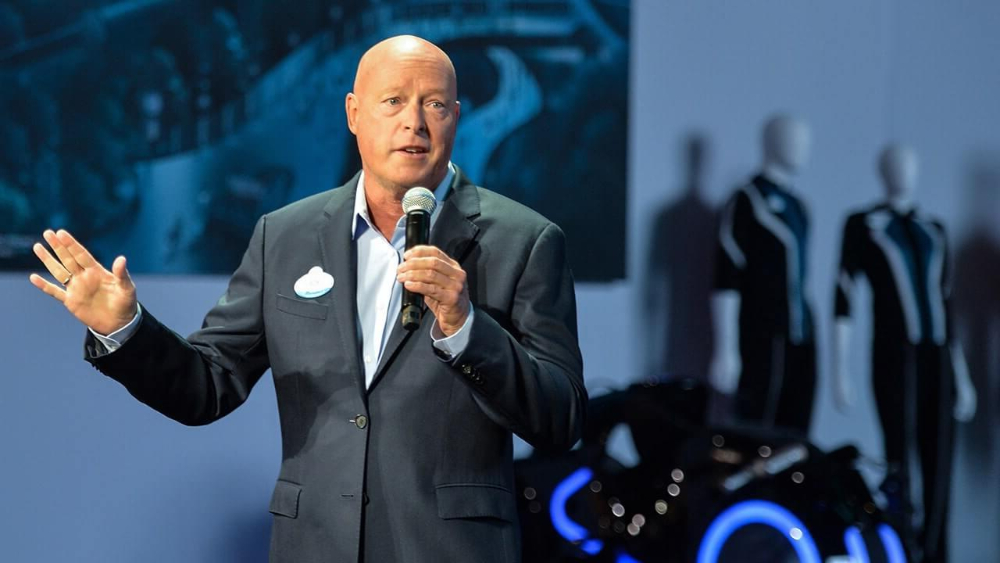
Back when Michael Jordan was actively playing basketball and thus, was one of the best-known people on the entire planet, he was selling hundreds of millions of dollars worth of Nike gear each year. His signature sneakers were the most popular brand on the market, and thanks to his considerable prowess as both an athlete and a personality, he carried an enormous amount of sway with consumers.
Because of this, Jordan would sometimes take flak from others who wondered why he wasn’t a louder voice for societal change, particularly regarding systemic racism in this country. His response was both cynical and understandable:
“Republicans buy sneakers, too.”
I thought of that last week in the midst of Disney CEO Bob Chapek’s self-created controversy regarding Florida’s hateful “Don’t Say Gay” bill — a controversy that remains ongoing. Chapek’s company, of course, has close ties to the state, what with its four theme parks and numerous cruise ships that come and go from various ports of call. So it makes sense that he might tread lightly when it comes to being involved in Florida politics, especially when the state’s politicians could make life more difficult for Disney if they wanted to.
They wouldn’t, though, because Disney employs nearly 80,000 people in the state, and taking on a company of its size and influence is a sure loser for anyone from either side of the aisle, but let’s come back to that.
The law in question is designed to stop schools and teachers from introducing the idea of LGBTQ+ people to youngsters. It prohibits any discussion of the subject for children younger than fourth grade (i.e. 9-10 year-olds), and then states that any other conversation thereafter must be age-appropriate. What counts as “age-appropriate” is open to interpretation, which is sort of the point because it puts the power in the hands of those who don’t want it mentioned at all. Furthermore, parents are now given the right to sue teachers and school districts if they feel their children are being “indoctrinated” into some kind of Gay Education that might result in their children rejecting their natural heterosexuality, or some such garbage.

To say the law is hateful is putting it lightly, but then the legislator who introduced the bill in the first place has referred to gay people as “an infestation,” so its pernicious intent should be crystal clear. Governor Ron DeSantis, who likens himself a younger, smarter, savvier Donald Trump, has tried to put a good face on the bill, calling it a protection against sex education for students too young for it, but even he can’t maintain the facade. When asked about children with two moms or two dads, or teachers with a same-sex partner, and how they’re supposed to talk about their lives, he deflected and sidestepped, because there is no good answer for him politically.
The proposed law is meant to persecute people who are “the other,” and this kind of thing has been in play since this country was founded. Whether the “other” is being female, or Black, or Jewish, or Muslim, or Native American, or Japanese, or anything else, it’s always something, and always somebody.
More and more these days, the “other” is being gay or Trans, and the use of LGTBQ+ people as scapegoats for whatever else is wrong in people’s lives is clearly working out for the far right. An aide for Texas Governor Greg Abbott said anti-Trans policies are “a winning strategy,” and if that quote left you nauseated then you feel the same way I did when I first read it.

When Chapek initially responded last week to the Don’t Say Gay bill, he made a comment about Disney’s multicultural content being its statement. That went over about as well as you might expect, so he tried again a few days later, saying on an investor call that Disney doesn’t necessarily know how the politicians to whom they donate are going to vote.
This is, of course, complete and utter nonsense, which was evident to anyone who pays even the slightest attention to these things, and even plenty of people who don’t. In the process, what had initially felt like a gimme for Disney — to be on the right side of a nasty issue — had become a completely avoidable controversy that had engulfed both the company and its new CEO, whose early run in the job has already been somewhat rife with self-inflicted wounds.
Recall, please, that in his first two years on the job, the theme parks’ Genie and Lightning Lane — a sort of revamped FastPass system designed to help park-goers but which was deemed too expensive, too complicated, and too restrictive — had a faulty rollout; the absurd Scarlett Johansson lawsuit happened; and now this, all on his watch. That’s a lot of stuff in a short amount of time, all of it totally avoidable.
When Disney’s LGBTQ+ employees rightfully revolted against both statements, Chapek realized he needed to take a different tack, and finally got it right, announcing once and for all that Disney would be pausing all political donations in Florida while it reevaluated the framework of its policy. While he was at it, he apologized to his employees, writing in a statement, “It is clear that this is not just an issue about a bill in Florida, but instead yet another challenge to basic human rights. You needed me to be a stronger ally in the fight for equal rights and I let you down. I am sorry.”

Bob Chapek is a brilliant businessman. His work in the Theme Parks and Resorts division, as well as that of Consumer Products, made billions for the company, and that’s why he was chosen to succeed the greatest CEO the company has ever had, Bob Iger, who left behind some Jordan-sized shoes to fill. Despite Chapek’s enormous paycheck and considerable power, I don’t envy him that.
But — and you knew this was coming — he still has a lot to learn about the public-facing part of the gig. When he was in Parks and Resorts, he could work in relative anonymity. Now that he is the face and voice of one of the world’s largest and most influential entertainment companies, he needs to understand not just his position in the company, but his company’s position in the world, and how to best use that position to influence positive change in a way that Jordan never really did.
Disney is one of Florida’s largest employers, and as such, it wields an enormous amount of power there. It is also the biggest studio in Hollywood and thus, wields an enormous amount of power there as well. Bob Chapek has had a rough start, but he can find his way and maybe even become one of Disney’s great leaders. He just needs to start getting things right the first time.
 Neil Turitz is a journalist, essayist, author, and filmmaker who has worked in and written about Hollywood for nearly 25 years, though he has never lived there. These days, he splits his time between New York City and the Berkshires. He’s not on Twitter, but you can find him on Instagram @6wordreviews.
Neil Turitz is a journalist, essayist, author, and filmmaker who has worked in and written about Hollywood for nearly 25 years, though he has never lived there. These days, he splits his time between New York City and the Berkshires. He’s not on Twitter, but you can find him on Instagram @6wordreviews.
You can read a new installation of The Accidental Turitz every Wednesday, and all previous columns can be found here.





